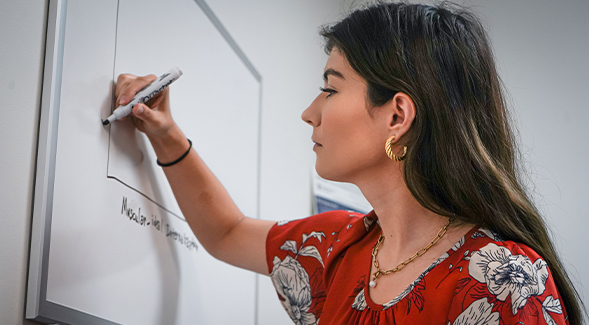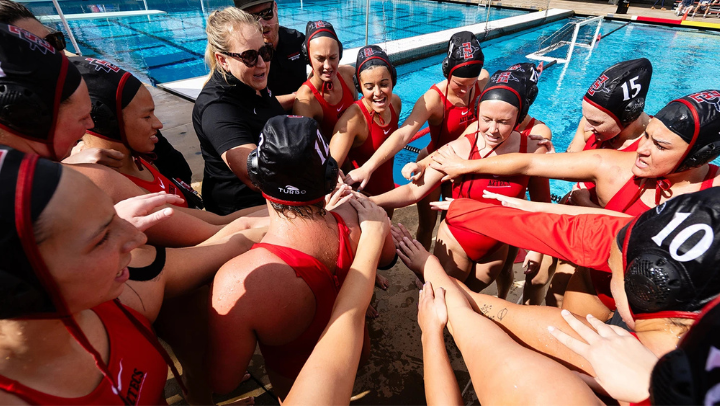In Her Words: Lessons from the Lab
SDSU psychology major reflects on her journey from novice researcher to campus leader.

The article first published in the 2022 edition of Highlights: A Magazine of Research, Scholarship and Creative Activities at SDSU.
Rebecca Mendoza is a senior psychology major with minors in dance and honors interdisciplinary studies and the president of SDSU’s Undergraduate Research Committee. Here, she explains her work as an independent researcher on eating disorders and related subjects.
San Diego State University is the perfect institution for research because, even though it’s such a large school and we have a huge research backing, it feels small; it feels like everyone involved in research knows everyone.
There’s a lot of emphasis on interdisciplinary research at SDSU. I have a lot of friends who are working with multiple faculty in different groups and they’re sort of mixing these ideas from different departments on campus. Most problems in society are not one discipline and need expertise from multiple different perspectives.
Research has been the most rewarding experience for me because, at SDSU, I can get one-on-one help, whereas, I believe, if I was at another institution, I couldn’t get that kind of mentorship. My mentors helped me through everything that I needed and they genuinely care about teaching me how to become an independent researcher.
I got involved in research because I knew I wanted to study eating disorders and go on to a clinical psychology graduate program.
Even if you don’t want to go to graduate school, research is important because it teaches you how to be a good worker, how to think analytically and critically of knowledge, something that’s applicable to any job. And it’s a way to get experience in what you want to do before graduating.
There’s also so many ways on campus that research can be used, either for credit for classes or as funding for tuition through different programs and that’s something a lot of people I don’t think are aware of. Research has made college possible for me by helping pay my tuition.
Starting Out
My freshman year is actually when the pandemic started, so it was pretty hard to get into a research lab then. I actually applied to the lab I’m in now freshman year, but they weren’t accepting students.
The pre-MARC (Maximizing Access to Research Careers) class and the Undergraduate Research Committee really helped me gain a lot of professional knowledge, everything I needed to know for academia that, as a minority student, I was not aware of before. Even just how to send an email to a professor I was not sure how to do!
When I first started in the Body Image, Sexuality and Health Lab, my graduate student mentor, Lexi Convertino, and advisor, said, “You don't have any publications or presentations, so we're going to get you those this year so that you can apply to graduate school.” They've really given me every opportunity and more; I’ve submitted a first-author paper for review and I will be traveling to Puerto Rico to talk about my research.
I’ve gotten to work on something like eight projects in the past year or so. I've definitely been able to become more independent with my research this past year and that's been hard, but nice. It's a lot of learning! I started with just doing data entry, then meeting with participants. I would take on more until eventually, a few months ago, I could analyze the data.
My favorite project is probably the one that looked at trauma in adolescence as a predictor of disordered eating because I kind of came up with that idea on my own. It was something of great personal interest to me.
Eating disorders run in my family and I had to experience eating disorder treatment when I was ten to thirteen. I realized that there’s not much in the way of treatment for anyone under13 and there’s also a high rate of people going in and out of recovery. I want to see how I can help those who are in treatment and how I can, hopefully, come up with some sort of new treatment options or stop people from having eating disorders if we know certain developmental risks.
When I was presenting my findings from this project at a conference, people would walk by and be like, “Oh, that’s sad,” but for me, I was coming from, “Wow, this is exciting!” I found a result that’s important because no one had ever done these studies in adolescents before.
People don't really think of researchers as being the main health care helpers. I'm not a doctor in a hospital; I'm not going to be there to help someone directly, but I’ve learned that work that is done through research greatly impacts the treatments and knowledge of these disorders.
Interview by Sarah White; lightly edited for space and clarity.



